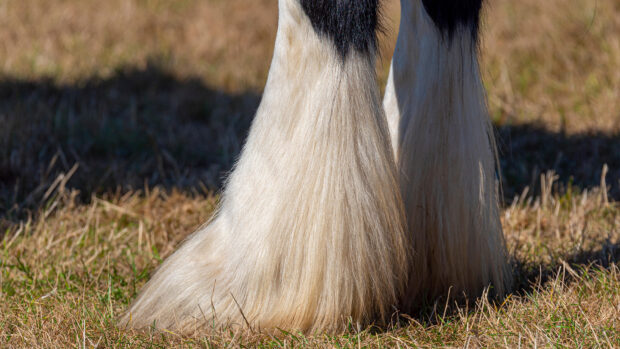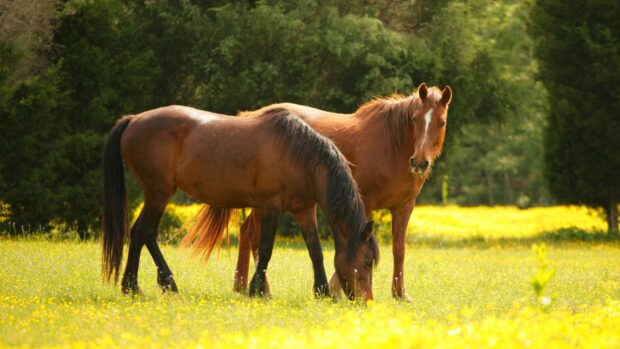In the past, the thyroid gland has been blamed for more than its fair share of problems. But the latest technology and improved blood tests indicate that true thyroid disease in horses is quite rare, and ensuring the right levels of iodine in your horse’s diet can prevent most problems.
The thyroid gland is a relatively small but important organ in both horses and humans. Its function is mainly the production and storage of thyroid hormones. These hormones can have an effect on many parts of the body and on a wide variety of tissue types, which is why thyroid “failure” can produce many non-specific signs.
Iodine is essential for the manufacture of the two main thyroid hormones, known as T3 and T4, with the process regulated by another hormone — known as the “thyroid stimulating hormone” or TSH — which is produced by the pituitary gland nearby.
When things go wrong they can be classified as primary, secondary or tertiary failure, depending on what has actually caused the malfunction.
Primary thyroid disease
Inadequate thyroid hormone production, caused by (for example):
- Too much or, less commonly, too little dietary iodine
- Certain chemicals in forage, for example, nitrates — known as “goitrogenic agents” — can block hormone production
- Tumours
- Infection — “thyroiditis”
Secondary thyroid disease
Inadequate production of TSH due, for example, to a tumour in the pituitary gland.
Tertiary thyroid disease
Inability to use the thyroid hormones within the body, due to certain other “non-thyroidal” factors, for example:
- Medicines such as bute or steroids
- excessively high-energy or high-protein diets
- increased zinc or copper
- starvation
Foals appear to be especially vulnerable to thyroid disease. They can even become affected while still in the womb if their dam’s diet is deficient in iodine.
Hypothyroidism and hyperthyroidism
Hypothyroidism is the term used to describe below normal levels of circulating thyroid hormones, and the effects this can have on the rest of the body.
True primary hypothyroidism — usually due to a deficiency in iodine — is rare because most commercial feeds provide more than adequate amounts, but other factors can still play a part to upset the balance.
Signs of Hypothyroidism in adults
- Dullness and lethargy
- Slow heart rate
- Thickening of tissues, especially around face and lower limbs
- Poor performance and/or exercise intolerance
- Obesity, despite a variable or even reduced appetite
- Muscle problems, including tying up
- Hypothermia (tendency to feel the cold)
- Infertility in stallions and mares
- Dry, scaling skin and a dull coat
- Delayed shedding of coat or patchy hair loss
Signs of Hypothyroidism in foals
- Weak at birth and often not full-term
- Poor sucking and righting reflexes
- Lack of coordination
- Hypothermia
- Long coat
- Respiratory problems
- Stunted growth
- Developmental bone and muscle problems, such as undershot jaw and bent legs
- Early death
Treatment depends on whether the thyroid gland itself is at fault, or whether the hypothyroidism is secondary to a problem elsewhere in the body. Cases of confirmed primary hypothyroidism do well on dietary supplementation. All supplemented horses should be monitored regularly, and many appear to make a spontaneous recovery with time. Consult your vet if you are concerned.
Hyperthyroidism occurs when the thyroid gland becomes overactive, and it is extremely rare in horses, only having been reported in a few geldings over 20 years of age so far.
It is usually due to a functional tumour in one lobe and produces a range of signs comparable with those seen in humans with the same condition, including:
- Non-painful enlargement of one side of the thyroid gland (occasionally both)
- Increased heart rate, with some abnormalities to the rhythm
- Horses may be thin, despite often having a huge appetite
- Horses may be excitable and restless
- Increased thirst
- Inability to sweat
- Hair loss, often in multiple patches
The prevention of thyroid disease lies mainly with ensuring your horse’s diet has a balanced amount of iodine — especially broodmares in-foal. Most commercial feeds and supplements contain iodised salt already, so the need to top up on iodine levels tends to be rare.
In the past seaweed-based preparations have been linked to iodine overdose — and it has even been suggested that washes, creams and lotions containing iodine should be used sparingly.
SUBSCRIBE TO HORSE & HOUND AND SAVE Enjoy all the latest equestrian news and competition reports delivered straight to your door every week. To subscribe for just £1.43 a copy click here >>
|



